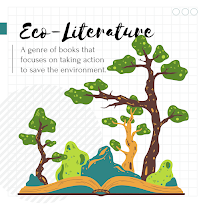I ran across 2 articles that got me thinking about the genre of "eco-literature:"
- The Wire's: "Could Eco-Literature Be the Next Major Literary Wave?" by literary critic Rajesh Subramanian
- Lit Hub's "Beyond Apocalypse: How the New Eco-Literature Points Toward Ways of Reshaping Our Consciousness" By Alan Rossi (9-21-2022)
As an avid reader, the concept of "eco-literature" definitely has its draw for me. I loved the older elementary aged students Operation Redwood by S. Terrell French. Carl Hiaasen's "eco-adventure" books for young adults are always entertaining, as are the Calpurnia Tate series. I also adore a slew of picture books with an environmental slant.
I've read a lot of environmental non-fiction books, and they all talk about how important it is to take action and how that is a major way to counter the doom and gloom. (Case in point, my posts on "A Trio of Messengers on Hope" and Heather White's One Green Thing book). I've read some non-fiction books that did not have this focus, and I felt like I was walking away with a slight state of despair. There needs to be some element of hope or inspiration, otherwise what is the take away? That the world will be wrecked if we don't do something. For those of us who are drawn to environmental issues, we already know that. More doom and gloom just kills all motivation and leads to doomscrolling our phone in a blob on the couch.
So, when I encountered these two articles about eco-literature, I instantly wondered if a good ol' fashioned rom-com read of escapism was what might better soothe my soul rather than the apocalypse of climate disaster. Secondarily, I took inventory of my list of books mentioned above. Perhaps the common denominator here are they are all books for pre-teens and teens, and maybe that's where the doom and gloom stays away!
But I read the articles anyway. And I didn't walk away frightened.
In The Wire's article by literary critic Rajesh Subramanian , cli-fi is defined as such:
"Cli-fi often ventures into the realms of sci-fi and/or speculative fiction when the narrative gets rooted in future or in an imaginary geographical locale. The litmus test is how far such fiction evokes in the reader a sense of urgency towards an action to save the environment, or, if they are capable of leaving a deep impression to humans conscious of their role in saving the earth."He goes on to write:
"Eco-lit needs to delve deeper into portrayals of how environmental degradation leads to human agony, suffering and displacements; how citizens turn into refugees within their own country; how economic and political exploitation turn human life upside down and jeopardise the environment, thereby making it unsuitable for life in future. But it needs to be done as literature, as human stories of subtlety, not just the sterile badgering of activism."
Of course, it takes me back to high school English class and all the general themes of conflict in novels:
Rajesh Subramanian goes on to discuss how it can't be moralistic or dogmatic, which some writings can take this slant. I felt that when I read The Overstory, and it felt heavy.
As Alan Rossi explained in the Lit Hub article, "With the climate crisis as its animating force, new books are asking new questions about what it means to be a mind experiencing a world in crisis."
The world is in crisis. In more ways than one. So looking at that through the lens of books and characters and how they deal with it, maybe there are things to learn not only about the world, but about ourselves, in reading books with this slant. He goes on to analyze several books and how their themes are allegories to the environmental crisis in some ways. Interesting food for thought. In one book discussion in particular, he discusses how it focuses on how do the characters go about taking action.
He ends with a great quote about this genre:
- Man versus Man
- Man versus Nature
- Man versus Self
- Man versus Society
- Man versus Supernatural
- Man versus Technology
Rajesh Subramanian goes on to discuss how it can't be moralistic or dogmatic, which some writings can take this slant. I felt that when I read The Overstory, and it felt heavy.
As Alan Rossi explained in the Lit Hub article, "With the climate crisis as its animating force, new books are asking new questions about what it means to be a mind experiencing a world in crisis."
The world is in crisis. In more ways than one. So looking at that through the lens of books and characters and how they deal with it, maybe there are things to learn not only about the world, but about ourselves, in reading books with this slant. He goes on to analyze several books and how their themes are allegories to the environmental crisis in some ways. Interesting food for thought. In one book discussion in particular, he discusses how it focuses on how do the characters go about taking action.
He ends with a great quote about this genre:
"In this way, the new eco-literature is not just about the pending apocalypse or dystopia or climate change alone. Rather, these books are about how we encounter the world, which means they are about our minds. Everything begins in our consciousness, and these books point toward ways of reshaping that consciousness in order to really encounter the vast thing we’re changing."
Images created at Canva.com



No comments :
Post a Comment